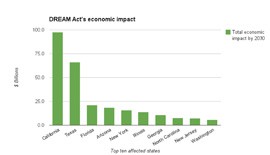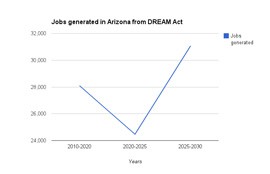Cronkite News has moved to a new home at cronkitenews.azpbs.org. Use this site to search archives from 2011 to May 2015. You can search the new site for current stories.
Report: Approving DREAM Act would boost Arizona’s economy
WASHINGTON – Arizona could add more than 83,000 jobs and see an additional $18.4 billion in economic activity by 2030 if the DREAM Act was approved, a new report claims.
The Arizona impact is just part of the $329 billion in economic activity that could be generated if the 2.1 million undocumented youths now in this country could earn citizenship, said authors of “The Economic Benefits of Passing the DREAM Act.”
“The future of our economy is in the balance,” said Angela Kelley, vice president of immigration policy at the Center for American Progress, in a conference call to release the report Monday. The report was prepared by the center and the Partnership for a New American Economy.
“The dollars, cents and the commonsense of this kind of reform is irrefutable,” Kelley said.
But Ira Mehlman of the Federation for American Immigration Reform was more than happy to refute the report. He questioned the reliability of any economic report that tries to predict 18 years into the future, saying it might as well be a prediction about the weather.
“It’s hardly convincing that we should be running to do this,” Mehlman said.
“This” is the Development, Relief and Education for Alien Minors Act – the DREAM Act – that would provide a path to citizenship for youth brought to this country illegally, if they met certain criteria.
Such minors would have to prove that they were brought here before age 16 and have lived here for at least five years to qualify. To earn citizenship, they have to pursue higher education or serve in the military for at least two years, among other requirements.
The bill was first proposed in Congress in 2001 but has yet to pass.
Backers argue that people the bill would affect have done nothing wrong and are Americans “in every single way, but on paper.”
“The hopes of these high-achieving young people are thwarted because, through no fault of their own, they’re here without legal status,” Los Angeles Mayor Antonio Villaraigosa said on Monday’s call.
Juan Carlos Guzman, one of the report’s authors, said the economic benefit to making those people citizens – as opposed to just letting them stay without citizenship – is that their earning capacity would increase because of higher education and access to higher-paying jobs.
That causes a “ripple effect” in the economy, where increased wages cause increased consumer spending. The report said that would create a total of 1.4 million jobs nationally and 83,648 in Arizona over the next 18 years.
Lee McPheters, director of the JP Morgan Chase Economic Outlook Center at the W.P Carey School of Business, said it is generally true that higher levels of education will lead to higher incomes and higher spending.
“The overall analysis is consistent with what we know about how higher education levels affect economic development and make states (and the nation) more competitive,” he said in an email Monday. “I think this is the most important message of the report.”
Madeleine Sumption, senior policy analyst at the Migration Policy Institute, said the claim that passing the DREAM Act would be an economic plus is “relatively uncontroversial.”
“If you think of the DREAMers as people who are ultimately staying and becoming a part of society, they become an investment,” Sumption said.
Mehlman said the report does not account for the cost of opportunities lost to American citizens and students, who would be competing with DREAM Act beneficiaries for jobs and college placement.
“There are other people who can be harmed by this,” Mehlman said.
He also said the report – and the act – ignores the status of the proposed beneficiaries.
“Who created this situation for them?” Mehlman asked of the minors who would be affected. “Not the American people – it’s their parents, who knew they were breaking the law.”
But Guzman cited his own experience as an example of how an immigrant can contribute positively to the economy.
“I was born in Colombia, and I came here legally to study,” he said. “And I am helping the economy. Similarly, with the DREAM Act, you are investing in people.
“The more delay in passing this, the more delay for getting benefits,” he said.








